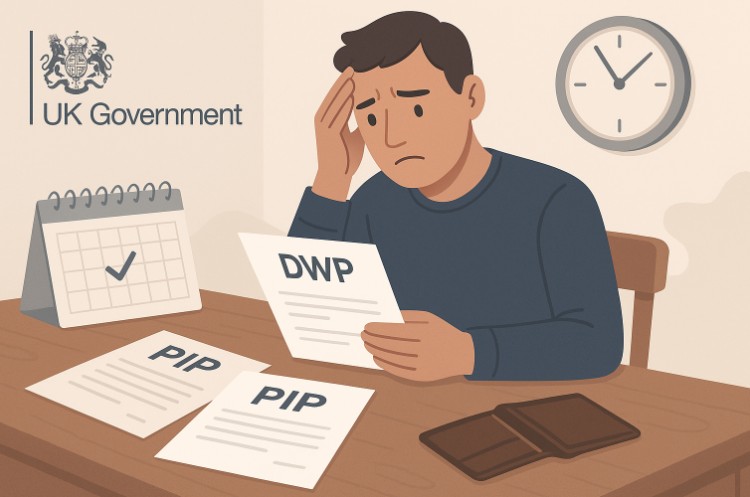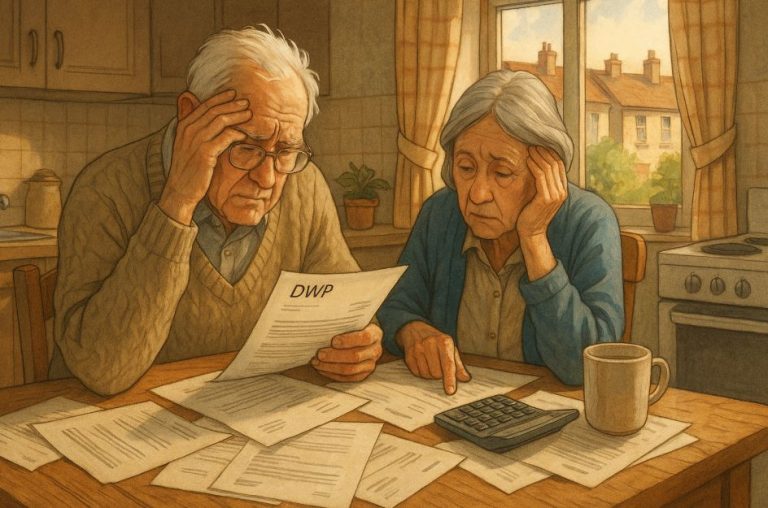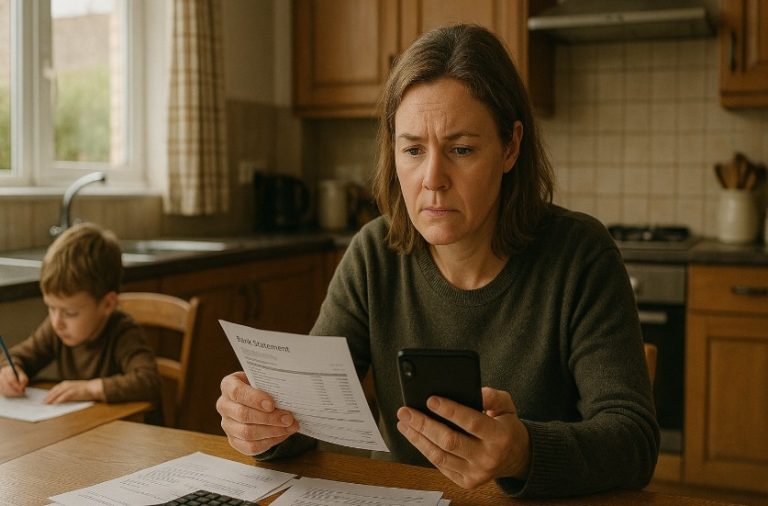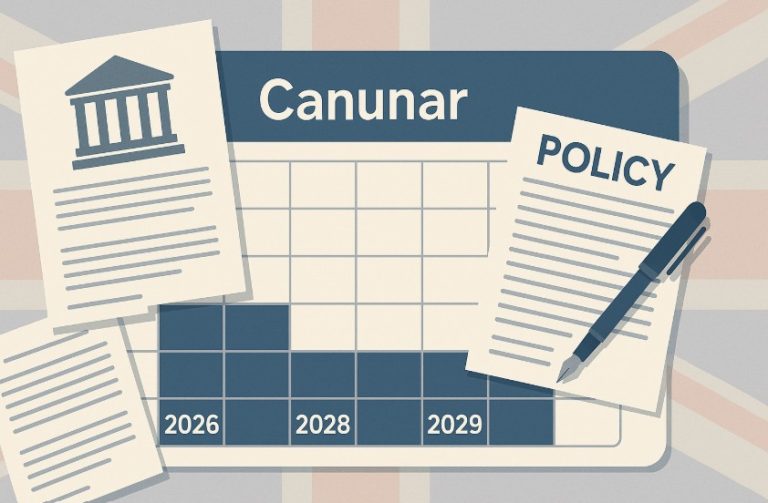Changes in health, living arrangements, or care needs can significantly impact someone’s entitlement to government support.
For individuals claiming Attendance Allowance, it’s critical to understand what qualifies as a change of circumstances and why the Department for Work and Pensions (DWP) must be informed promptly.
Failing to report these changes can lead to financial penalties or overpayments that must be repaid.
This blog explains when and why a claimant should notify the DWP about any relevant changes, what to report, and how to do it.
What is Attendance Allowance and Who Can Claim It?
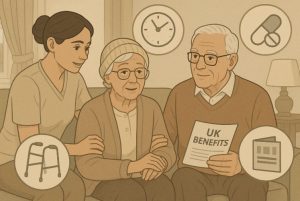
Attendance Allowance is a UK government benefit for people over State Pension age who need help with personal care due to a physical or mental disability.
It is not means-tested and does not require the claimant to have paid National Insurance contributions. The benefit is designed to help cover the cost of extra support for individuals who need supervision or assistance with daily activities.
There are two payment rates:
- Lower rate: For those who require frequent help during the day or night
- Higher rate: For those needing help both during the day and at night, or who are terminally ill
Claimants must have required help for at least six months before making a claim unless they are applying under the special rules for end of life.
Why is Reporting a Change in Circumstances So Important?
The amount of Attendance Allowance a person receives depends on the level of support they require. When circumstances change and are not reported, the benefit amount may no longer be accurate. This could result in either overpayment or underpayment.
Overpayments often occur when a claimant’s care needs reduce or they enter hospital or a care home but do not inform the DWP. In these cases, the DWP may reclaim funds or issue a financial penalty.
Underpayments can happen if the claimant’s condition worsens and they do not report it, thus missing out on the higher rate of benefit.
Failing to report changes may also be treated as benefit fraud. The DWP actively investigates such cases and can take legal action if they find that a claimant knowingly withheld information or misrepresented their situation.
What Types of Changes Must Be Reported to the DWP?
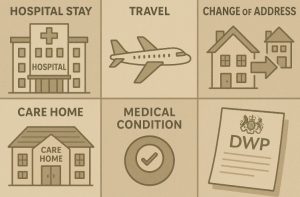
When receiving Attendance Allowance, it is essential that claimants inform the Department for Work and Pensions (DWP) of any change in circumstances that could affect their entitlement. This is a legal responsibility and not optional.
Any failure to report a relevant change could lead to the benefit being reduced, suspended, or stopped entirely. In more serious cases, the DWP may demand repayment of overpaid benefits or impose a financial penalty.
There are various categories of changes that must be reported, all of which could influence either the eligibility or the amount awarded. Understanding each of these helps ensure compliance and prevents unintentional issues with your benefit claim.
Changes in the Help You Need or Your Medical Condition
One of the most significant areas that impacts your Attendance Allowance is the level of care you need. If your condition worsens and you now require help more often or for different tasks (such as bathing, dressing, eating, or moving around), this might make you eligible for the higher rate of Attendance Allowance.
Conversely, if your condition improves and you no longer need as much help, the DWP needs to know, as this could reduce your entitlement.
For example, if someone who previously needed support once a day now requires assistance several times daily, this represents a substantial change. The DWP will assess whether that change affects the current award.
Admission to Hospital or a Care Home
If a claimant is admitted to hospital or a residential care facility, they must inform the DWP immediately.
Details such as the name and address of the hospital or care home, the dates of admission, and how the stay is being paid for are all required.
Attendance Allowance is typically suspended if you stay in hospital for more than 28 days, unless the care is privately funded.
For care home residents whose fees are covered by the local authority, Attendance Allowance may also be stopped.
These changes are time-sensitive, and failing to report them promptly could lead to overpayments that the DWP will recover later.
Diagnosis of a Terminal Illness
If a healthcare professional has said that the claimant may have 12 months or less to live, the DWP must be notified. This is referred to as applying under the Special Rules for End of Life (SREL).
In such cases, Attendance Allowance can be paid at the higher rate, and the application process is typically faster and more straightforward.
Notification requires a medical statement, often referred to as a DS1500 form, which is completed by a doctor or specialist nurse.
Travelling or Moving Abroad for Extended Periods
Another important situation that must be reported is leaving the UK for more than four weeks.
Attendance Allowance is generally only paid while the claimant resides in the UK. Temporary travel abroad may be permitted, but extended stays or permanent relocation can impact eligibility.
For example, if a claimant decides to spend the winter in another country and is away for six weeks, they need to inform the DWP before leaving. In some rare cases, payments may continue for a limited period if the absence is temporary and the claimant intends to return.
Entry into Prison or Legal Detention
Attendance Allowance is not payable while the claimant is serving a prison sentence or being held in legal custody.
As soon as a person is taken into custody, this change must be reported to the DWP. Claimants will need to provide the date of imprisonment and information about the expected duration.
Not reporting this change can result in serious consequences, including the recovery of any money paid during the time of ineligibility.
Change of Personal Information
If your name, address, bank details, or contact information changes, this must be updated with the DWP.
While this kind of change may not directly affect your entitlement, having up-to-date records ensures that correspondence and payments reach you without disruption.
For example, if you move home or switch banks, the DWP needs this information to prevent missed payments or security issues.
Doctor or Medical Professional Details Change
The DWP may need to contact your GP or specialist when reviewing your claim or assessing a change in your condition.
If your main healthcare provider changes, you should report the new name and contact details. This ensures that the DWP can obtain accurate and up-to-date medical evidence if needed.
Change in Immigration Status (If Applicable)
For claimants who are not British citizens, immigration status may influence benefit entitlement. If your legal status in the UK changes, for example, moving from a work visa to indefinite leave to remain, this must be reported. The DWP will use this information to confirm whether you still meet the eligibility criteria under UK benefit law.
Decision to Stop Receiving Attendance Allowance
Some claimants may decide they no longer wish to receive Attendance Allowance, especially if their health has improved or they no longer need regular help. In such cases, it is essential to notify the DWP and formally close the claim.
Simply stopping use of the benefit without telling the DWP is not sufficient and could result in confusion or overpayment.
All changes should be reported as soon as they occur. Timely reporting protects both the claimant and the integrity of the benefit system.
How Do You Notify the DWP of a Change in Circumstances?
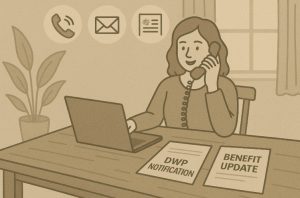
Changes must be reported to the Attendance Allowance helpline as soon as possible. Claimants can do this by phone, textphone, Relay UK, or British Sign Language (BSL) video relay service for those with hearing or speech difficulties.
How to Contact the Attendance Allowance Helpline:
| Contact Method | Details |
| Telephone | 0800 731 0122 |
| Textphone | 0800 731 0317 |
| Relay UK | Dial 18001 then 0800 731 0122 |
| BSL Video Relay | Available online through GOV.UK |
| Operating Hours | Monday to Friday, 8am to 6pm |
When contacting the DWP, it’s helpful to have the claimant’s National Insurance number, current claim details, and any documentation related to the change. Supporting evidence such as hospital letters, GP notes, or proof of travel may be required to process the update.
When Should You Report a Change to Avoid Penalties?
Reporting should be done as soon as the change occurs. The DWP expects immediate notification to ensure that benefits are accurately assessed.
Delaying the report of a change could result in incorrect payments, which may then be recovered through deductions or lump sum repayments.
For example, if a person is admitted to a hospital and fails to report it until after discharge, they may have received payments they were not entitled to. In such cases, the DWP can ask for repayment and impose a civil penalty.
Prompt reporting ensures the claim remains accurate and compliant with benefit regulations. In situations where the change is unclear or borderline, it is better to contact the DWP for clarification rather than risk non-compliance.
What Happens After You Report a Change in Circumstances?
Once a change is reported, the DWP will process the update and assess its impact on the claim. Depending on the nature of the change, the process may include:
- Requesting additional information or documents
- Conducting a reassessment of the care needs
- Making a decision about adjusting the benefit rate
- Sending a revised award notice to the claimant
In cases where the change is significant, such as a terminal illness diagnosis, the DWP may fast-track the claim under the special rules and move the claimant to the higher rate of Attendance Allowance without delay.
If the change results in a reduced entitlement, the claimant will receive a notification explaining the new rate and the reasons for the decision. If the claimant disagrees, they can ask for a mandatory reconsideration.
Can Attendance Allowance Be Stopped or Reduced After Reporting a Change?
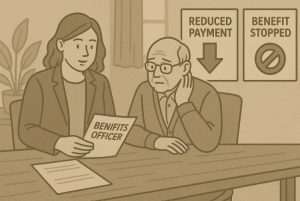
Attendance Allowance payments can be altered based on the updated information provided. The benefit may be:
- Increased, if the claimant’s condition worsens and their care needs grow
- Reduced, if the claimant’s health improves or they enter an institution where costs are covered
- Stopped temporarily or permanently, depending on specific eligibility changes
For example, if someone moves into a care home and their stay is paid for by the local authority, the Attendance Allowance may be suspended. Likewise, if they travel outside the UK for more than the allowable duration, they may no longer be eligible.
Changes do not always lead to a reduction. In fact, failing to report a worsening condition could mean missing out on higher benefits. The DWP evaluates each case individually to determine the appropriate outcome.
What Should Carers Know About Reporting Changes?
Carers play an essential role in supporting Attendance Allowance recipients and may be receiving Carer’s Allowance. Changes in either party’s circumstances could affect both benefits. Carers should be aware of:
- Any changes in the claimant’s need for care
- Their own employment or income status
- Moving away or being unable to provide regular care
It is the responsibility of both the carer and the claimant to ensure that any relevant changes are reported. If a carer stops looking after the individual or their hours of care drop below the required threshold, this should be reported to the DWP immediately.
Failing to update the department may result in Carer’s Allowance overpayments or affect the Attendance Allowance claim if care needs are no longer being met to the same degree.
What Are Common Mistakes When Reporting Changes to the DWP?
Many claimants assume minor updates don’t need to be reported, which can lead to unintentional overpayments. Common mistakes include:
- Not reporting short hospital stays that extend beyond the 28-day limit
- Failing to notify the DWP of a move to a care facility
- Assuming benefits will adjust automatically without notification
- Providing incorrect or incomplete contact information
To reduce the risk of issues, claimants are encouraged to keep records of changes, such as hospital admissions, GP visits, and changes to care routines. Reviewing the GOV.UK guidance periodically can also help ensure full compliance.
How Can You Keep Track of Changes and Stay Compliant?
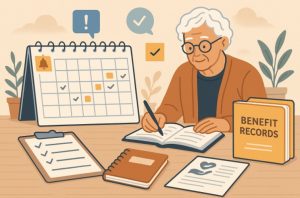
Staying organised and proactive is essential for managing a long-term benefit like Attendance Allowance. Claimants and their carers can take simple steps to remain in line with DWP expectations:
- Maintain a care diary to track support needs and frequency
- Store copies of medical letters, care plans, and DWP communications
- Set reminders for reporting obligations if changes are planned, such as travel abroad
- Consult local advice services like Citizens Advice or Age UK for guidance
Keeping open communication with the DWP is key. If in doubt, it’s always better to report a change and be informed that no action is needed than risk the consequences of not reporting.
Conclusion
Staying informed and proactive about any attendance allowance change of circumstances is essential to maintaining compliance and receiving the correct benefit.
Whether it’s a hospital stay, a change in health, or updated personal details, promptly notifying the DWP ensures your claim stays accurate.
Mistakes or delays can lead to overpayments, loss of benefits, or even legal repercussions. By understanding what to report and how, claimants can protect their financial stability and legal standing.
FAQs About Attendance Allowance Change of Circumstances
What happens if I go into hospital while claiming Attendance Allowance?
If you’re in hospital for more than 28 days, your benefit may be paused. Report this immediately to avoid overpayment.
Can I still receive Attendance Allowance if I move abroad?
You must inform the DWP if you plan to leave the UK for more than four weeks. Your eligibility may be affected depending on your destination and reason for travel.
Will Attendance Allowance continue if I enter a care home?
It depends on how the care home is funded. If the local authority pays for your stay, your payments may stop. Report the change for a proper assessment.
Can my benefit increase if my condition worsens?
Yes. If your care needs increase, you may be eligible for the higher rate. Submit medical evidence to support the reassessment.
Is Attendance Allowance affected by savings or income?
No. Attendance Allowance is not means-tested and is not affected by savings or income levels.
What if I made a mistake when reporting a change?
Contact the DWP as soon as possible to correct the information. They will assess whether there was an overpayment or other issue.
How do I appeal a decision made after reporting a change?
You can request a mandatory reconsideration within one month of the decision. If you still disagree, you can appeal to a benefits tribunal.
Source – https://www.gov.uk/attendance-allowance/report-change-in-circumstances


